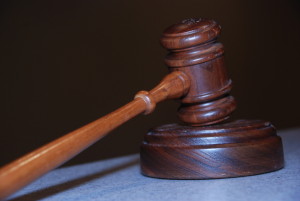 Earlier this month, the Supreme Judicial Court issued a decision in Commonwealth v. Hartfield, which addressed a defendant’s Sixth Amendment confrontation right and right to call witnesses at a probation violation hearing.
Earlier this month, the Supreme Judicial Court issued a decision in Commonwealth v. Hartfield, which addressed a defendant’s Sixth Amendment confrontation right and right to call witnesses at a probation violation hearing.
The background of the case is as follows: Hartfield was on probation for a drug offense when a probation violation issued alleging that he had violated the conditions of his probation by sexually assaulting his girlfriend’s seventeen year old daughter. The girlfriend provided an alibi for Hartfield and “added that the alleged victim was known to lie.” Hartfield told the police “that he had not gotten along with the alleged victim since he found some embarrassing photographs on her cellular telephone and confronted her with the photographs…. The mother also told the police about the cellular telephone incident and the alleged victim’s antagonism toward [Hartfield]. The alleged victim described” that antagonism before the grand jury. At the probation violation hearing, the judge heard testimony from a probation officer and police detective Figueroa. “Over [Hartfield’s] objection, the judge … admitted in evidence [through Figueroa’s testimony] the alleged victim’s testimony before the grand jury, two serology reports, and a [damaging DNA] report from the … police crime laboratory. The reports were admitted through … Figueroa; no criminalist testified.” “After the probation department rested, [Hartfield] sought to call the alleged victim as a witness…. The judge initially allowed her to testify,” but then changed his mind, reasoning that her statements to the grand jury had already been admitted as hearsay through Figueroa and that “‘she shouldn’t have to go through recounting this event several times.’” The judge proceeded to find that Hartfield had violated his probation by committing a new offense and specifically noted that Figueroa’s testimony and the DNA evidence was “the most compelling” evidence to support the finding of a violation.
On appeal, Hartfield argued (1) that by barring “his examination of the alleged victim, the hearing judge violated his due process right to present a defense;” and (2) “that the admission of the alleged victim’s grand jury testimony and the serology and DNA reports … violated his due process right to confront adverse witnesses.”
In its review, the SJC vacated the revocation of Hartfield’s probation and remanded the case for a new probation violation hearing. The Court specifically ruled that the hearing judge’s finding that it was “inherently inconsistent to allow the alleged victim to be called to testify by [Hartfield] after her hearsay statements were admitted in evidence when offered by the probation department” was in error. As to the defendant’s first argument (his due process right to present a defense), the Court explained “that a probationer has a presumptive due process right to call witnesses in his or her defense, but that this “presumption may be overcome by countervailing interests.” The Court further stated, however, that “[t]he judge may consider the admission of … hearsay evidence in determining in the totality of circumstances whether the witness’s testimony would be merely cumulative,” but that “the testimony would not be cumulative where the probationer seeks to elicit from the witness additional information that would support the inference that the probationer did not commit the violation or would demonstrate that the hearsay evidence suggesting that he did commit the violation is unworthy of belief.” The Court specified that in this case, “the judge made the error of conflating the right to present a defense with the right to confront and cross-examine witnesses, and determined that, where there is good cause to admit an alleged victim’s hearsay, the probationer may not call the witness to the stand to challenge the veracity and accuracy of the hearsay account.” The Court stated that the hearing judge’s error was of constitutional dimension and was not harmless beyond a reasonable doubt, as Hartfield’s “best chance” of casting doubt on the alleged victim’s credibility “was through [her] testimony.”
The SJC also ruled that Hartfield’s right to confront adverse witnesses was violated by the admission of the serology and DNA reports and by the admission of the alleged victim’s grand jury testimony. The Court explained that “hearsay evidence is admissible in a probation violation hearing where it has substantial indicia of reliability,” but that here, the hearsay evidence on which the judge relied lacked such indicia. “[T]he two serology reports and the DNA report from the … crime laboratory were not certified” and were introduced through the testimony of Figueroa, “who was not their author. The alleged victim’s grand jury testimony also was offered through … Figueroa…. [But] the judge made no written findings [or oral findings on the record] regarding the reliability of the hearsay evidence on which he relied,” in violation of due process principles. “Consequently,” stated the Court, “apart from the DNA report, we cannot determine which hearsay evidence the judge relied upon in finding a violation of probation, or whether the judge found that evidence to have substantial indicia of reliability.”
Probation violation hearings have a lower standard of proof (preponderance of the evidence) than a criminal trial (beyond a reasonable doubt). Additionally, as evidenced in this case, the rules of evidence are relaxed. The combination of the two means that it is that much easier for the Commonwealth to prove a violation of probation. Given the fact that probationers often face just as serious consequences at a probation violation hearing as they do after a finding of guilt at trial, it is imperative to have an attorney who will fully investigate and creatively litigate probation violation hearings. Attorney Daniel Cappetta has successfully represented many clients at probation violation hearings and always fights for his clients at every stage of the representation. Call him for a free consultation today.
 Massachusetts Criminal Lawyer Blog
Massachusetts Criminal Lawyer Blog

